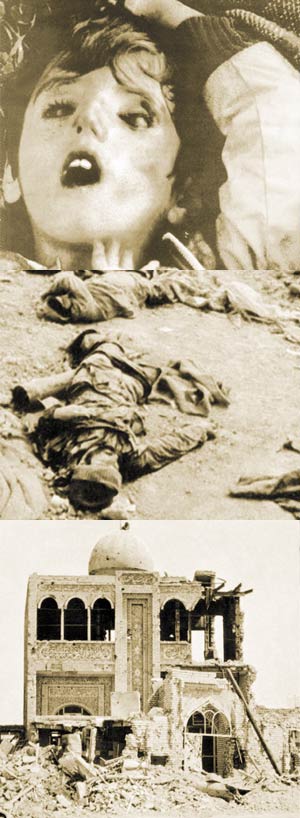 |
Various religious sects and ethnic groups make up Iraq's population of 25 million. Some 95 percent are Muslims, and they have experienced oppression, torture and fear for many years. The most important factor in the killing and poverty inflicted on the Muslim population has been Saddam Hussein's "fascist" dictatorship.
Saddam Hussein took power in 1979, and after that refused to allow religious circles to enjoy any kind of political or social activity. Saddam was the architect of the martyrdom of 5,000 Muslim Kurds by chemical weapons at Halabja, inflicted terrible suffering on his own people and those of their neighbor by starting the Iran-Iraq war, and tried to conquer Kuwait in 1990. Although he has sometimes spoken in religious terms in order to try and win Muslim support, that is nothing but a hypocritical policy.
A brief look at Saddam's past will let us see the foundations of the regime he established.
 |
The events that brought Saddam to power in Iraq began with a coup. In February 1963, a group of army officers and street activists calling themselves the Baath (Resurgence) Party overthrew General Abdul Karim Kassem, who was in power at the time. Among these militants one man, a member of a six-man team charged with killing Kassem, stood out: Saddam Hussein al-Takriti, in other words Saddam Hussein from Takrit. Although not a soldier, Saddam was seen frequently in uniform and immediately after the coup, he was brought in by the Baath regime and tasked with committing acts of terror and murder. His first action was to develop effective new torture methods with which to interrogate those opposed to the coup. This Baath administration which began with a palace coup came to an end in November of the same year. Saddam's torture center then came to light, full of pain-inflicting devices of his own invention.
The Baath administration of less than 10 months' duration had also been ended by a coup. However, the party staged another coup on July 17, 1968, and this time it was to last. The deputy leader of this second coup was none other than torture specialist Saddam Hussein himself. By appointing his own relatives to key posts and doing away with his political rivals, he soon held all political power in his own hands. The pitiless torturer had become dictator of Iraq.
Despite all his ruthlessness and cruelty, one of the main factors which allowed Saddam to stay in power was the support he received from outside the country. The most fascinating alliances were established to keep Saddam in power. Heading the list of these was the alliance he formed with Mossad, one of the darkest intelligence organizations in the world. Mossad regarded Saddam as an important pawn in Israel's Middle East strategy and occasionally used Saddam in the directing of the course of events which might turn out in Israel's interests.
The Iran-Iraq War |
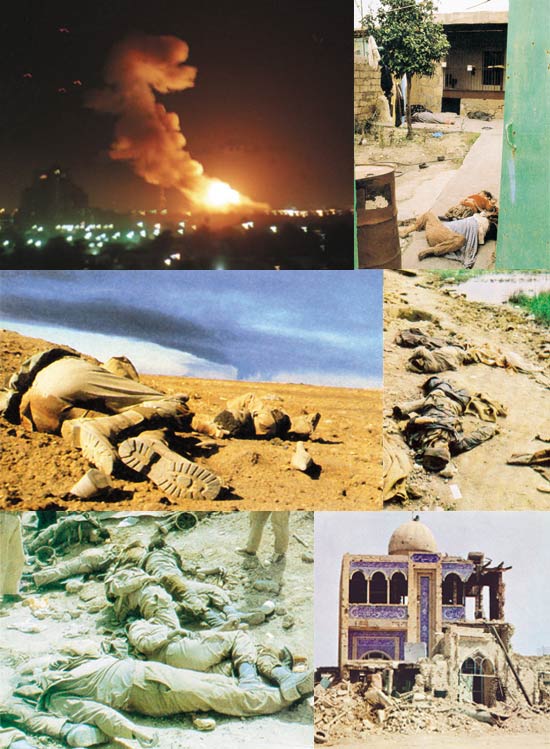 |
| One million people out of a total Iraqi population of 17 million were either killed or wounded as a result of the war with Iran, started by the fascist Saddam regime. Another 1 million were forced to flee the country for political and economic reasons. The nearly-decade-long war effectively ruined Iraq. |
In his second book, written after the Gulf War, the former Mossad agent Victor Ostrovsky would write in describing this interesting view of Saddam in Israel that that country wished the Iraqi dictator to remain in power because he was totally irrational in terms of international policy and was likely to engage in useful stupidity which might be able to be used by Israel.
This provides most important information about the true face of Saddam Hussein. Saddam never followed a policy aimed at the good of Muslims and attempting to defend the people's interests. All the measures he has taken up until today, directed by certain circles opposed to religion, have been aimed at harming Muslims and his people. The fact that throughout Saddam's administration the lives of the Iraqi people were full of war and conflicts, and that most of these were aimed at other Muslim countries, is an important indication of this fact.
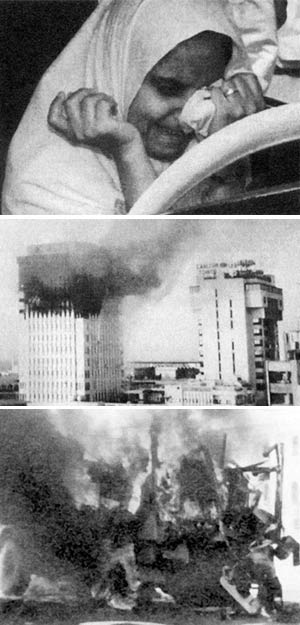 |
| Saddam's fascist methods were no better than those of Hitler and Mussolini, and he spread terror to neighboring countries. The sudden invasion of Kuwait after the war with Iran is just one example. That invasion inflicted huge physical and psychological damage on Kuwait, and brought about an embargo on Iraq that has been causing great suffering to its people for years. |
After securing power, Saddam constantly sought out war and conflict. In 1980 he suddenly invaded Iran for no reason, thus starting a war that over the next eight years took the lives of hundreds of thousands of Iraqis and Iranians alike. Two years after the war finally ended, he then invaded Kuwait without cause and thus brought about the 1991 Gulf War. Yet Saddam's terror was not only aimed at neighboring countries but at his own people, too. Throughout his reign those seen as opponents of the regime and various political and ethnic groups were subjected to all kinds of savagery. In 1990, Newsweek carried the following description of Saddam's fascist character:
His detractors call him a bloodthirsty tyrant - the Butcher of Baghdad. Saddam Hussein rules Iraq with an iron side a steel glove, backed by a million-man Army and a legion of informers, assassins and torturers. Saddam, as he is known throughout the Middle East, is utterly ruthless in the pursuit of glory for himself and his country. He has not hesitated to use poison gas on enemies both foreign and domestic.56
Saddam shed the blood of many Iraqis. By the end of the war with Iran, 1 million out of a population of 17 million Iraqis had been killed or wounded. More than a million people fled the country for political or economic reasons. Washington-based human rights organization Middle East Watch states that forced exile, arrest and punishment for no crime as well as torture and "mystery" killings are some of the methods frequently employed. According to Amnesty International, torture, even of children includes such methods as roasting victims over flames, amputating noses, limbs, breasts and sexual organs, and hammering nails into bodies.57
Saddam demonstrated his fascist attitude towards people of different ethnic origins with the 1988 Halabja massacre. Nerve gas was used against the civilian Kurdish population, and many innocent people died in agony, with no distinction made between infants, the elderly, men and women. Amnesty International reported that 5,000 Kurds died in that massacre, and several thousand more in similar attacks elsewhere in the country.58
The tortures inflicted on political detainees by the fascist regime in Iraq are even more terrible. A doctor who fled the country describes them in these terms:
I was an intern in a hospital in the south. Only doctors could see those people brought in from prison. Most of them were just lumps of flesh and soon died. Not one political detainee lived through the torture. I fled when I realized I was going to be arrested.59
Even Saddam's own family and close colleagues were not spared his cruelty. Saddam's stepbrother Barzan Takriti and his son Uday fled to the United Arab Emirates out of fear he might have them killed. Two of his sons-in-law, Hussein and Saddam Kamel, fled to Jordan in 1995 out of similar fears. Saddam then guaranteed that their lives would not be threatened and asked them to return. When the two brothers returned to Baghdad, however, they were immediately put to death, along with their father. Their mother's savaged body was found later.
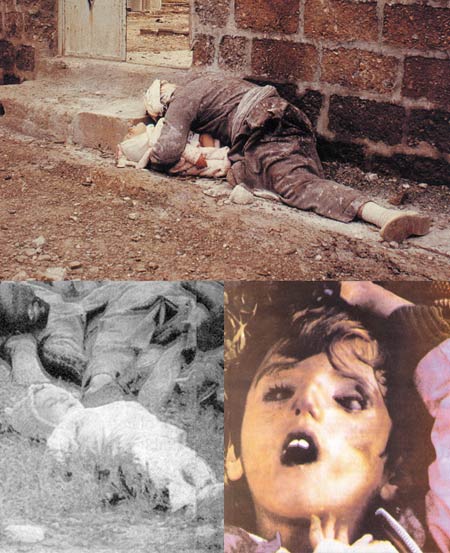 |
| Terrible images of Saddam's massacre at Halabja. |
The Iraqi leader intimidated opponents of his regime who fled the country using the most terrible methods. For instance, General Najib Salihi fled to Jordan in 1995. He revealed that videotapes of his family and friends being raped had been sent to him, and that this had happened to many other opposition figures.
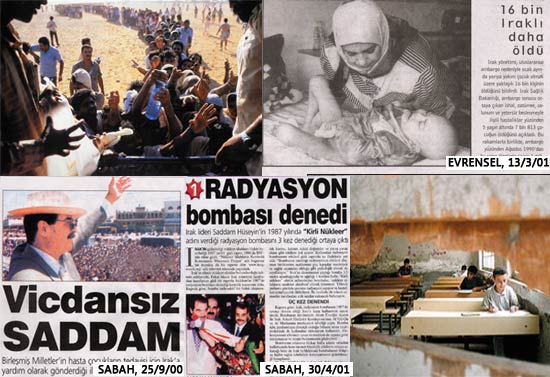 |
| The embargo imposed on Iraq after the invasion of Kuwait has only increased the suffering of Iraq's people. Saddam himself remained untouched by it. |
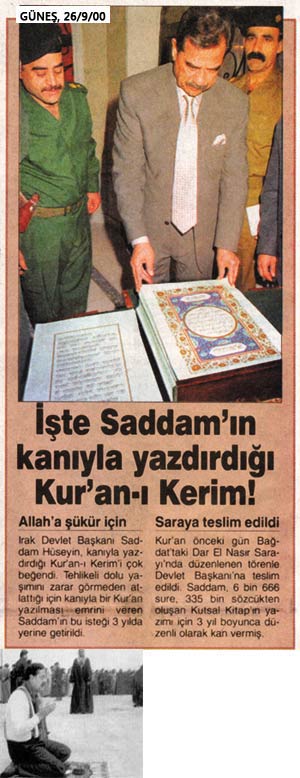 |
| Like all fascist leaders, Saddam also tried to bolster his support by playing on people's religious feelings. |
The most important feature of the mass hypnotism Saddam cast over the people of Iraq is that he operated under a false religious mask. Saddam always employed a religious style, aimed at the people, in his domestic and foreign policies, and engaged in actions designed to pull the wool over their eyes. That is why he sometimes resorted to portraying himself as the defender of the Islamic world, and tried to take advantage of the people's religious sensitivities, as when the words "Allahu Akbar" were added to the Iraqi flag during the Gulf War.
Looking at all the cruelty that is inflicted makes it quite clear that this has nothing whatsoever to do with the religion of Islam or the values of the Qur'an. Allah reveals the situation of such people in a verse:
They swear by Allah that they are from among you while they are not from among you... (Surat at-Tawba: 56)
Obviously, Saddam was nothing like a true Islamic leader. He was a leading militant of the communist and Stalinist Baath Party. As a member of the party he received military training based on Darwinism and materialism. He adopted the social Darwinist Jamal Abdul Nasser as a model and described himself as a socialist revolutionary. It is clear that his actions are forbidden in the Qur'an, and strongly condemned. For instance, racism played a prior role in Saddam's actions within the country. Many innocent people were savagely slain, just because of their ethnic origins. With the Halabja massacre, Saddam went down in history as the murderer of 5,000 people. Like many other racist leaders, Saddam claimed that his own ethnic roots were superior. In the Qur'an, however, Allah makes it clear that superiority lies not in race, color or any other such feature, but rather in godliness or closeness to Allah, faith and morality. Racism, on the other hand, is described in these words in the Qur'an:
Those who are disbelievers filled their hearts with fanatical rage – the fanatical rage of the Time of Ignorance – and Allah sent down serenity to His Messenger and to the believers, and bound them to the expression of heedfulness which they had most right to and were most entitled to. Allah has knowledge of all things.(Surat al-Fath: 26)
Allah has created people with different races and colors. Man is a helpless creature, fully dependent on Allah, so nobody has any right to claim to be superior to any other person or nation. At the moment of death, on the Day of Judgment or in the hereafter, such things as race will be of no importance. On that day, nobody will be able to hold anyone else to account for their race or origins. Those who are now behaving savagely because of their race, killing people and even burning them alive, will on that day realize how helpless and needy they are, no matter their race. In one verse Allah reveals the following about the Day of Judgment:
Then when the Trumpet is blown, that Day there will be no family ties between them; they will not be able to question one another. (Surat al-Muminun: 101)
In addition to racism, Saddam also believed in fascism. He inflicted fascist repression on his own people, and just like Hitler and Mussolini, he believed that war a sacred virtue with a perverted mentality. Whereas apart from certain causes set out in the Qur'an, starting wars is a great evil and a grave sin. What Allah says about the unbelieving sons of Israel applies to all wicked people:
... Each time they kindle the fire of war, Allah extinguishes it. They rush about the earth corrupting it. Allah does not love corrupters." (Surat al-Ma'ida: 64)
In short, since the 1970s, the Muslims of Iraq were subjected to the cruelty of a dictator who was far removed from the morality set out in the Qur'an, but one who believed instead in racial and tribal bigotry, had no hesitation about killing hundreds of thousands of innocent people to satisfy his own desires, and who took great pleasure in cruelty and torture. Even after Saddam, Iraq has still not achieved stability and well-being. The conflict in the country continues and security has not been fully established. It is to be hoped that Iraq will soon attain an enlightened order that will bring peace and security to all ethnic and religious groups.
56- Russell Watson, John Barry, "Public Enemy, No:1", Newsweek, 9 April 1990, p. 8
57- Ray Wilkinson, "Iraq's Dark Knight", Newsweek, 9 April 1990, p.12
58- Ray Wilkinson, "Iraq's Dark Knight", Newsweek, 9 April 1990, p.12
59- Hurriyet (Turkish Daily), 21 January 1999, Thursday